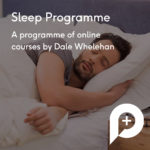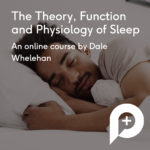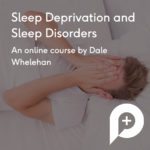Dive deeper into sleep and find out why sleep effects your practice as well as your patients recovery with Dale Whelehan.
Sleep is an essential part of our daily routine and on anverage we spend a third of our lives asleep! Evidence also shows that sleep affects almost every type of tissue and system in the body and that a chronic lack of sleep can increase the risk for non-communicable diseases such as hypertension, diabetes, cardiovascular disease and obesity. Sleep is vital to good health!
Not only is sleep vital for healthy living it is also important for safe and effective clinical practice. We have some brand new online courses for you to explain why. Check them out below and never have a bad night sleep again.
Courses & Presenter
These three courses have been created and presented by Dale Whelehan, an experience clinician and PhD candidate in the effects of sleep in clinical performance. His PhD studies are based at Trinity College Dublin and you can read about his reasearch profile on Research Gate. You can also follow Dale on Twitter.
Sleep Programme

Quality sleep is vital to ensure good health and optimal function for patients and healthcare practitioners. In this three-part series, Dale Whelehan will review the evidence and theories related to why we need sleep, the physiological processes involved in sleep, how sleep is regulated and measured, sleep disorders and how sleep deprivation affects health.
Never Have a Bad Night Sleep
The Courses
The Theory, Function and Physiology of Sleep

Sleep is an important part of our daily routine and we spend about a third of our time sleeping. Quality sleep is vital for good health and optimal function in our professional capacity. But what is sleep? Why do we need sleep and what are the physiological processes involved in sleep? Dale Whelehan discusses these topics in this first course of a three-part series on sleep.
Why Do We Need Sleep?
How We Sleep

The regulation of sleep can be described by the two-process model of sleep. This model shows us that sleep is governed by two independent, yet interrelated processes, the homeostatic sleep drive and the circadian rhythm. Specifically, these processes govern the timing of sleep, the intensity of sleep and the duration of sleep. Various factors have an impact on sleep propensity such as sleep deprivation, the time of day and our age. In this course, we will explore how sleep is regulated and how we measure sleep and the related regulation processes.
Speak The Language of Sleep
Sleep Deprivation and Sleep Disorders

Sleep is a universal experience, and it is essential for general health and survival. However, sleep has become a significant public health issue, as more and more people are becoming sleep deprived. This course, the third in a series of three sleep courses, explores the impact of sleep deprivation on health and introduces you to the main types of sleep disorders and the impact these can have on our patients’ health and our own professional performance.
Learn How Sleep Influences Your Practice


